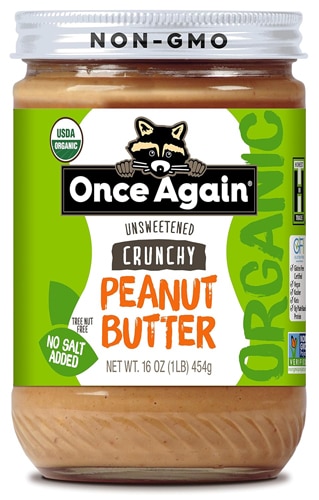Once Again Organic Peanut Butter Salt Free Crunchy Description
Just Peanuts! Once Again™ packages in glass jars to preserve the flavor profile and maximize the shelf-life of their products, and glass is conducive to recycling.
Once Again's raccoon logo: Four baby raccoons grew up on the factory grounds. Apparently orphaned, they really enjoyed the nut butters. So... in turn, Once Again™ adopted them and created the company logo in their honor. Once Again's mascot, Rocky, has become a symbol of their wholesome nature and their closeness to the earth.
Free Of
Gluten, salt, sugar, GMOs, tree nut, animal ingredients.
*These statements have not been evaluated by the Food and Drug Administration. This product is not intended to diagnose, treat, cure, or prevent any disease.
Nutrient Facts
Serving Size: 2 Tbsp. (30 g)
Servings per Container: 15
| Amount Per Serving | % Daily Value |
|
| Calories | 190 | |
|
| Total Fat | 14 g | 18% |
|
| Saturated Fat | 2 g | 10% |
|
| Trans Fat | 0 g | |
|
| Cholesterol | 0 mg | 0% |
|
| Sodium | 0 mg | 0% |
|
| Total Carbohydrates | 7 g | 3% |
|
| Dietary Fiber | 2 g | 7% |
|
| Total Sugars | 2 g | |
|
| Incl 0g Added Sugars | | 0% |
|
| Protein | 8 g | * |
|
| Vitamin D | | 0% |
|
| Calcium | | 2% |
|
| Iron | | 0% |
|
| Potassium | | 4% |
|
*Daily value not established.
Other Ingredients: Dry roasted blanched organic peanuts.
MAY CONTAIN OCASSIONAL STEM OR SHELL FRAGMENT.
Warnings
Oil separation occurs naturally. To prevent, stir and refrigerate or freeze.
The product you receive may contain additional details or differ from what is shown on this page, or the product may have additional information revealed by partially peeling back the label. We recommend you reference the complete information included with your product before consumption and do not rely solely on the details shown on this page. For more information, please see our
full disclaimer.
Reviews
View printable version
Print Page
Thai Curry Miracle Noodles With Coconut-Peanut Broth
[vc_row][vc_column][vc_column_text]There are two miraculous things about this soup recipe. The first is a Thai-inspired broth bursting with complex flavors – each bite a symphony of salty, sweet, spicy, sour and creamy. The second culinary miracle is a filling serving of satisfying noodles with just five calories and three carbs (two of those being plant-based fiber!). The Miracle Noodle brand makes silky konjac noodles in every familiar shape to replace pasta or rice in your favorite dishes. This recipe includes Thai curry noodles and gobs of fresh vegetables in a rich coconut-peanut broth. Fill your bowl, savor the flavors and enjoy a full belly of plant-based ingredients.

Thai Curry Noodles With Coconut-Peanut Broth

Broth
- 1 Tbsp. olive oil
- 1/2 cup onion (diced)
- 2 cloves garlic (diced)
- 1 red bell pepper (thinly sliced)
- 1 jalapeño (diced)
- 2 broccoli stalks (diced)
- 1 can coconut milk
- 1/2 cup unsweetened flax milk
- 1/2 medium tomato (diced)
- 1/4 cup grated ginger
- 2 Tbsp. red chili paste
- 3 Tbsp. curry powder
- 3 drops liquid stevia
- 2 Tbsp. black pepper
- 2 Tbsp. turmeric
- 2 Tbsp. smoked paprika
- 1 tsp. salt
- 2 Tbsp. chunky peanut butter
- 1/4 cup basil (diced)
- 1/2 cup kale & spinach
Additional Ingredients
- 1 pkg. Miracle Noodle spaghetti (rinsed & dried)
- Purple cabbage (sliced)
- Black sesame seeds
- Cherry tomatoes (sliced)
- Bell pepper (sliced)
- Fresh basil leaves
- Red pepper flakes
- Heat oil in pot over medium-high heat. Sauté garlic, onion and jalapeno 8 minutes until fragrant.
- Add broth vegetables, toss and cook 5 minutes.
- Mix in red chili paste and spices, and cook 3 minutes. Pour in coconut and flax milks and bring to a simmer.
- Add stevia and peanut butter, mix well and simmer on low-medium heat 8 minutes with lid on.
- Add broth and vegetables to serving bowls, then layer in Miracle Noodles, cabbage, cherry tomatoes, sesame seeds, fresh basil and red pepper flakes.
Grab these ingredients and more Miracle Noodle products at Vitacost.

[/vc_column_text][/vc_column][/vc_row][vc_row][vc_column][vc_text_separator title="Featured Products" border_width="2"][vc_row_inner equal_height="yes" content_placement="middle" gap="35"][vc_column_inner width="1/3"][vc_single_image image="170175" img_size="full" alignment="center" onclick="custom_link" img_link_target="_blank" css=".vc_custom_1699397582701{padding-right: 7% !important;padding-left: 7% !important;}" link="https://www.vitacost.com/miracle-noodle-ready-to-eat-meal-thai-tom-yum"][/vc_column_inner][vc_column_inner width="1/3"][vc_single_image image="170174" img_size="full" alignment="center" onclick="custom_link" img_link_target="_blank" css=".vc_custom_1699397597310{padding-right: 7% !important;padding-left: 7% !important;}" link="https://www.vitacost.com/miracle-noodle-organic-ready-to-eat-spaghetti-noodles"][/vc_column_inner][vc_column_inner width="1/3"][vc_single_image image="170173" img_size="full" alignment="center" onclick="custom_link" img_link_target="_blank" css=".vc_custom_1699397614712{padding-right: 7% !important;padding-left: 7% !important;}" link="https://www.vitacost.com/miracle-noodle-bone-broth-beef-noodle-soup"][/vc_column_inner][/vc_row_inner][/vc_column][/vc_row]







